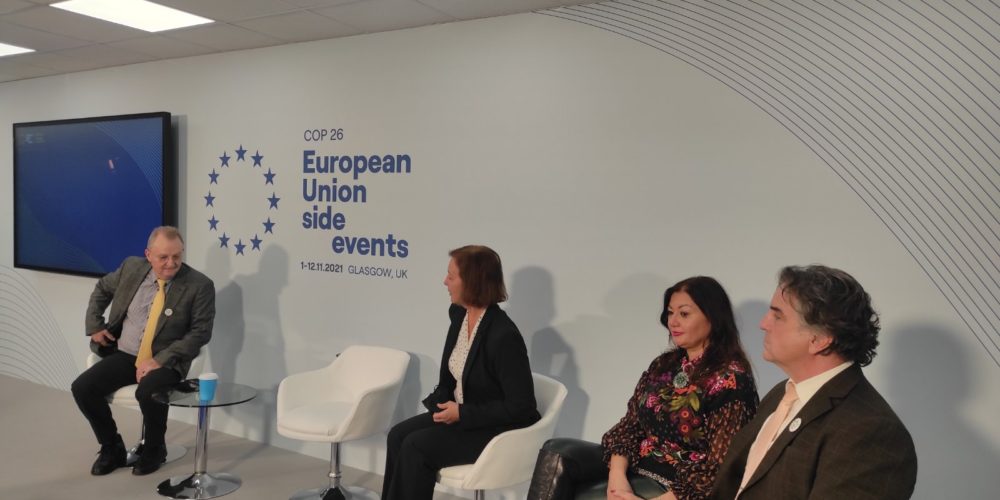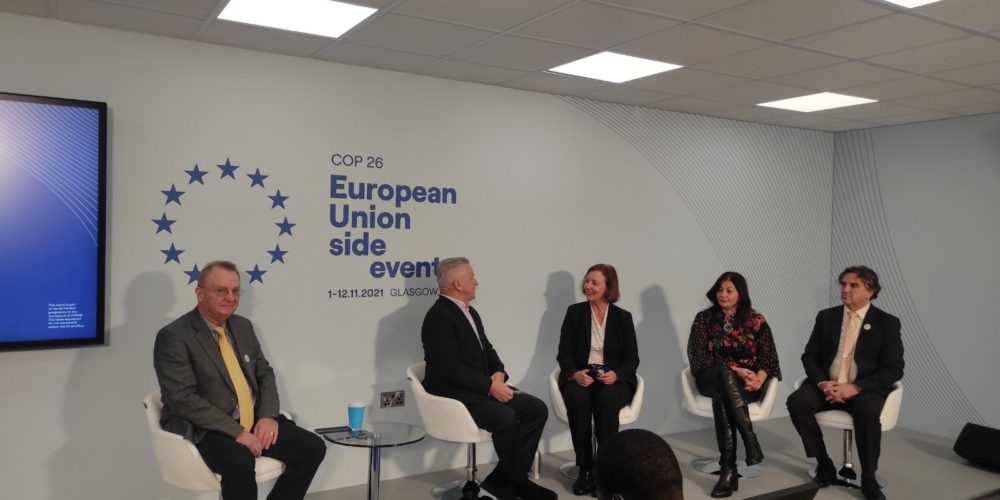E3 International LLC is taking part at the 26th UN Climate Change Conference of the Parties (COP26) in Glasgow.
Together with its partners CIFOR-ICRAF, Resilient Landscapes, and GASP, E3 International co-organized the EU Pavilion hybrid side event “Clean energy transition in Serbia and the Western Balkans: biomass, renewables, land restoration and green jobs” on 3 November 2021, which gathered experts from public and private sectors to explore innovative solutions in Serbia and the Balkan region and also to showcase Serbia and Bosnia and Herzegovina’s success stories of piloting fast-growing woody and reedy biomass projects.
The event was accessible through an online platform for virtual participation and was watched by almost 200 virtual attendees from all over the world.
The panelists who spoke on how to protect, restore and better manage land and natural resources to protect our climate were:
- Ravi Prabhu, Director of Innovation, Investment and Impact, CIFOR-ICRAF
- Mustafa Music, Deputy General Manager for development, Elektroprivreda BiH
- Antoine Avignon, Program Manager – Environment and Climate, EU Delegation to Serbia
- Tony Simons, Executive Director, CIFOR-ICRAF
- Bonnie Norman, President, E3 International
- Christopher Martius, Managing Director, Centre for International Forestry Reasearch (CIFOR)
- Biljana Ramic, Head of the Office for Strategic Planning, Ministry of Mining and Energy of the Republic of Serbia
- Sanela Klaric, Member of Parliament, Parliament of the Federation of Bosnia and Herzegovina
- Milena Djakonovic, Head of the Environmental Protection Service, Elektroprivreda Srbije
- Dusan Jovic, Director of Serbia Office, E3 International
Tony Simons, Executive Director, CIFOR-ICRAF said: “We have a plenty of aspirations, pledges and commitments in climate but our abilities to reach those is where we are failing. We need to bridge our solution gaps in climate action to achieve results. We’re all trying to fix the emissions gap. But there’s a solutions gap. Resilient Landscapes tries to fill it by looking at five things: technical feasibility, operational deliverability, environmental sustainability, social/political acceptability and financial viability”.
Antoine Avignon, Programme Manager, EU Delegation to Serbia, said that the European Union has set high environmental goals, and that the situation in Serbia and BiH is a “work in progress” – new legislation is being passed, new rules are being introduced. “My personal opinion is that it is never good enough, that we always have to try even harder,” said Antoine Avignon, adding that there is a growing interest of citizens in Serbia for green projects, financing, and calls for project proposals.
Bonnie Norman, President, E3 International presented the SLLEI Project in Serbia and Bosnia and Herzegovina and added: “What we’re trying to do with this project is to get bioenergy crops done right within the landscape. The goal: jobs, health, heat, power.”
Biljana Ramic, Head of the Office for Strategic Planning, Ministry of Mining and Energy of the Republic of Serbia expressed the view of the Serbian Ministry of Mining and Energy: “Serbia and Bosnia and Herzegovina rely heavily on coal consumption for energy production in general, and for heating, in particular. Specifically, 70 percent of electricity in Serbia comes from lignite, and the rest from hydroelectric power plants” She also added: “We need to find a new direction for the Western Balkans energy policy. It should be greener and we know we need to use more renewable energy. Biomass and bioenergy will have a significant and important role to assure a just transition”.
Videos
(7.11.2021): Green Agenda for the Western Balkans – Biomass Energy for Sustainability and Jobs. Hybrid GLF event.
(3.11.2021): Clean energy transition in the Western Balkans: biomass, renewables, land restoration and green jobs. Hybrid event at the COP26 EU Pavilion







